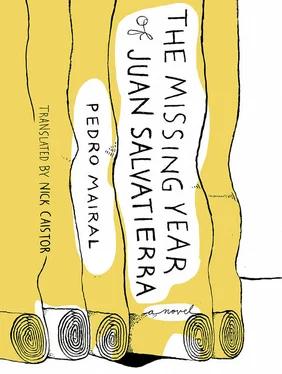At Salvatierra’s insistence, mom would call us regularly on the phone to see how we were. “Dad wants to know when you’re coming to visit us,” she was in the habit of saying, but we let the months go by without returning, until the vacations arrived and we went to spend Christmas with them. Both of us knew though that we were going to stay and live in Buenos Aires, and were accomplices in this sort of betrayal.
By now it was late. The whiskey on an empty stomach had given me the silly, clumsy courage to spread out one last roll before I left. It was from the eighties. At first all I saw were sandy shores and skinny greyhounds among the willows. Then I came across a portrait Salvatierra had done of my ex-wife Silvia and my son Gastón during some celebration or other in Barrancales. Just the two of them: I’m not there. As if we had already separated. Seated, Silvia is looking off to the right; my son Gastón, who must have been six or seven years old, is standing up, pressed against his mother and staring straight ahead. His eyes intimidated me. Salvatierra always painted them as if they were on the point of blinking. My son’s eyes, their transparent, slightly pained gaze. As if asking me why everything that happened had happened. The separation and the divorce, and going to fetch him so that we could ride our bikes in the Palermo woods on Saturday mornings. I had to sit down.
I stared at the painting, absorbed in it. It was shortly after this portrait was made that Silvia and I split up. There the two of them are. My wife and my son. As if I were rediscovering them exactly where I’d left them. As if they had stayed there waiting for me without moving in the shadows of the canvas for more than ten years. I knew Silvia was partly to blame, but here was Salvatierra showing me what I had lost. I found it hard to contemplate. My father had succeeded in capturing what had slipped through my fingers.
It was dark when I left the shed to cycle back to the house. A few stars were out, and there was a cool wind. I tried to spot potholes and bits of rubble in order to avoid them. A couple of blocks before I arrived, I heard a car accelerating behind me. I tried to see who it was, but its headlights blinded me. It seemed to be heading straight for me, to cut me off, threatening to run me over. I steered as best I could towards the pavement. Startled, I put one foot down on the ground. The car came to a halt a few meters further on. There were two people inside. The one in the passenger seat had his arm dangling out of the window. Without looking back, he shouted:
“Sell that pile of crap and have done with it!” At that, the car sped off, raising dirt.
I couldn’t make out their faces. Some neighbors came out to see what was going on and asked me what had happened. I didn’t know whether to tell them it had been a misunderstanding or that somebody had tried to kill me. I wasn’t sure either way.
Instead of continuing on home I went to the telephone office and called Luis. When I told him what had happened he said it had probably been thugs sent by Baldoni, the supermarket owner.
“He’s trying to put the screws on us so we’ll sell,” said Luis.
He seemed very certain, although I thought it was an incredible idea. Luis suggested I report the incident to the police if that would reassure me. He tried to play it down, saying, “No one’s going to kill us for a shed, Miguel.”
That was easy for him to say from so far off. Then he told me that the documents to get the painting out of the country weren’t going well. He’d been talking to a lawyer because, when he started the process, a problem had arisen. Luis asked for an export permit from the National Historical and Artistic Heritage Commission. The Commission discovered that, since years earlier Salvatierra’s work had been declared “part of the provincial heritage,” it could not be sold or allowed out of the country. If the province had in fact done nothing for the work, we had the right to take them to court and ask for this to be annulled. But that could take years. I couldn’t believe what I was hearing.
“Don’t say anything to the Dutch people for now,” he said.
I went home, no longer frightened so much as annoyed. For the bureaucracy to put obstacles in the way of getting Salvatierra’s work known, for Baldoni to try to scare me into selling him the shed… I saw the TV was on in the Dursts’ corner store, so I went in to have a beer and take my mind off things. I needed a bit of noise.
The next morning I went to the supermarket to confront Baldoni in his office.
“You’re saying I did what ?” he blustered.
He was really offended when I explained. He denied it outright. He said it was not his way of doing things. That he might be in a hurry to buy the land, but he would never send his people to put pressure on anyone.
“So what do your ‘people’ do?” I asked, emphasizing the fact that this was what he himself had called them.
“I’m in the Social Welfare office. We distribute the donations we’re given. Some people are annoyed with me because they reckon I keep the things for myself, so perhaps they confused you with someone on my team…”
I left more bewildered than ever. I went to the shed and watched Boris and Aldo at work. By now they did everything with mechanical efficiency. They would open one roll under the scanner, stretching it out on each side with identical movements, mirror images of one another. While the machine was copying that section, they rolled up the far end. Hanna came back from Misiones with wooden sculptures of little birds, jaguars, and alligators. From what she said, it seemed she’d been more impressed by the Iguazú Falls than by the Jesuit mission ruins. She spoke half Spanish and half Dutch, adding explanations for Boris.
Boris told me that the museum wanted to know how the export documents were going. They were anxious for a date when the move could take place because they would have to hire special transport. I didn’t tell him about the difficulties we were having with Customs. I said everything would be sorted out soon. Boris told me he would go on working until Saturday. If they carried on at the rate they were going the whole canvas would be digitalized by then. After that he’d have nothing more to do. He said that perhaps he’d go back to Holland until the work was ready to be shipped.
“So Saturday is your last day?” I asked him.
“Yes, Saturday,” he said.
Before they left I wanted to go and look for Ibáñez over in Uruguay. I was desperate to find the missing roll.
When Luis arrived on Friday, we decided to put on a farewell barbecue at home the next night for Aldo and the Dutch couple. We still had no idea what we were going to say about the bureaucratic obstacles. It wasn’t a simple matter. Luis had gotten nowhere trying to make the National Heritage Commission see reason. Once a work had been declared “of cultural interest” or “part of the cultural heritage,” that could not be rescinded. We would have to follow the legal procedures to have its ownership transferred back to us. We had to re-acquire something that not only was ours, but had been neglected for years by the institution that now, according to the law, was its legal owner.
We talked for some time in the kitchen. I suggested we cross to Uruguay to try to find Ibáñez. Luis said he didn’t have the papers needed for the car to get over the Uruguayan border, and that anyway my idea about where the missing roll might be was ridiculous. I told him we could get across by boat without the car, and that possibly it would be easier to look for a fisherman by water than by land. He told me I was crazy. My brother listened to my arguments without looking at me, pacing round the kitchen, snorting scornfully from time to time. Then he started washing the dishes. I told him what Jordán had said, and the things I had discovered by looking at more of the rolls. Luis didn’t reply, but dried the plates in silence. He wanted Salvatierra’s work to become known, not his life. He preferred not to find out if Salvatierra had been a smuggler. He wanted the canvases taken away once and for all: the shadow of that life rolled up in the shed seemed to weigh heavily on him.
Читать дальше












